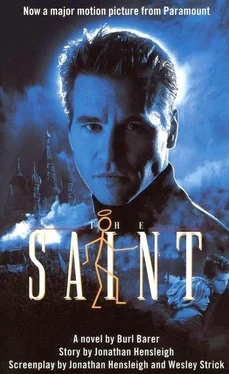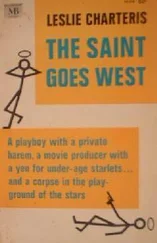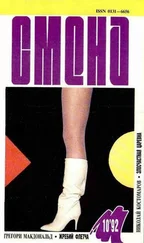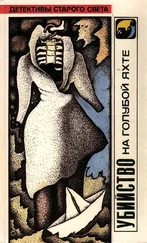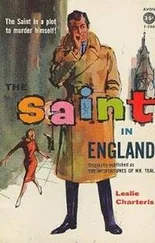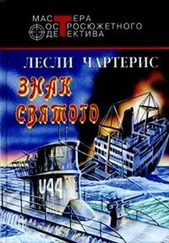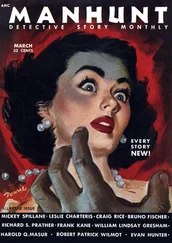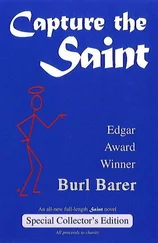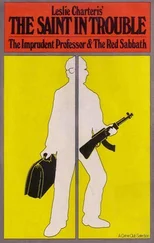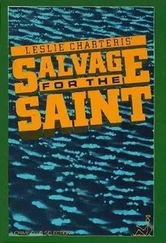“Here. Right here are the research and development costs. Those are the only costs — I repeat — the only costs you’re asked to defray.”
Karpov leaned over and cast an interested glance at the figures. When he saw the total, he almost fell off his presidential chair.
“Ten billion?! My God! You must be mad!”
Tretiak started to rise. Vereshagin and Botvin followed his lead.
Karpov motioned them back down.
“Wait, wait,” he said with forced joviality, “I thought we’d drink some Kremlyovakaya to get a bit warmer and discuss all this in more detail.”
Tretiak smiled.
Korshunov arose from the table and moved to a bookcase shelf. Hidden behind was a crystal decanter of vodka and some tumblers.
“Mr. President,” began Tretiak as he sat back down, “in all candor, I’m tired of these silly partisan political struggles. You ask the average Russian and he or she will tell you that politicians are boring, fighting is a waste of time, and that what we need is more comfort and less speeches.”
Karpov nodded. He wanted to know where Tretiak was going with this.
“If a major scientific breakthrough such as the one we are asking you to fund would bring warmth and happiness to the people, I would gladly devote my time and my life to my family business and... my dear family.” He threw an almost believable sentimental look at Ilya.
Karpov wasn’t gullible. He knew Tretiak was as sentimental as a rabid Doberman.
“In other words,” clarified the president, “you would withdraw your opposition?”
Tretiak showed his teeth in an approximation of a sincere smile. “It is my sweetest dream.”
The message was clear. Karpov looked at Korshunov. The latter poured the vodka.
“Without making any sort of commitment,” said Karpov officiously, “we wish to study these documents. Dr. Botvin, will you kindly explain, in layman’s terms, this cold fusion?”
Botvin cleared his throat, repositioned his fogged lenses, and began his elaborate, yet simple, explanation — an explanation not intended to make cold fusion any more understandable, but to make the ten billion in hard currency more obtainable.
He was, in effect, drawing a verbal map from Karpov’s wallet to Tretiak’s pocket.
“As the number of deaths from freezing mounts, the mood here is increasingly ominous,” stated CNN correspondent Jan Sharp broadcasting from an improvised canopy outside the Kremlin. “A bankrupt Russian government — unable to provide the heating oil its people so desperately need — claims to be working on some mysterious solution to the crisis.”
The street was strewn with broken bottles, charred trashcans, torn clothes, spent teargas cartridges, and Tretiak placards.
“Meanwhile,” continued Sharp, “what Ivan Tretiak’s Oktober Party bills as rallies are turning into nightly riots...”
Detailing the debris and disorder prevalent in Moscow, the newscaster paid no notice to the rain-slickered businessman edging past the clutter, folding his umbrella, and entering a small side-street shop.
Dark and narrow, the counters were crammed with cheap copies of Russian Orthodox art, cardboard icons, plastic chalices, tin pendants, and other low-rent replicas similar to the more authentic-looking items Templar had seen in the Moscow underground.
The owner, wearing an overcoat indoors and pacing the small space to stay warm, was the same woman who dealt in higher-priced but equally bogus items below ground.
“Excuse me,” said the businessman with a New Orleans accent, “but I’m looking for either an authentic relic from the estate of the late Prince von Oldenburg who was married to a sister of the czar, or a genuine Madonna icon...”
Frankie brightened, sensing a score.
“With an American dollar deposit, we could meet somewhere else. I can show you rare objects. Prince von Oldenburg” — she gave the name serious thought — “very rare, very famous. His grandson was a movie star, did you know that? See him on pirate videotapes from America. Old black and white.” Frankie made a motion with her hands as if turning a combination lock. “Breaking open the bad guy’s safe; breaking the women’s hearts, yes? A true Russian!”
She laughed, crinkling her eyes in a devilish smile.
“We’ll see what we can find from royalty formerly known as Prince. As for Madonna, Madonna costs a bit extra—”
“That’s fine,” he replied seriously. “But she’s gotta be wearing the cone-shaped bra.”
Frankie blinked in disbelief, then took a good look at the customer.
“Hey. Mr. Bulgari Chronograph. Real funny. Didn’t you make it out?”
“Almost, but I decided to stay.”
She squinted suspiciously. “Then, why’re you back, Bulgari?”
It was time for some truth telling. “My name is Templar, Simon Templar.”
He put out his hand in friendship, but Frankie didn’t take it. She glanced dubiously from his hand to his face.
“The men looking for you were crawling all over the tunnels like rats. They roughed me up, but I laughed in their faces. I said I didn’t know anything...”
Templar started to smile in appreciation, but it was cut short by her next remark.
“... so they shot Toli.”
Simon put his hand down. “I’m sorry, really. In a way, it’s partially my fault...”
“No, Tretiak’s fault,” insisted Frankie. “They would have killed you and your girlfriend, too. Where is she?”
“The American Embassy. She’s safe, for now, but this entire country is in danger.”
Frankie forced a rueful laugh. “No surprise. No justice.”
“ ‘The best beloved of all things in my sight is justice,’ ” said Templar, and he meant it.
“Wrong time, wrong town.”
Templar took a breath.
“I need your help to stop Tretiak.”
She stepped back defensively.
“Hey, it’s a big country — big country — and you’re saying I’m your best friend here?”
“I’m saying you’re my only friend.”
She looked away, pretending to examine a cardboard replica of the Kremlin. She was, in reality, reexamining her own personal commitment to an ethical standard above and beyond the selfishness, corruption, and materialism devouring her homeland.
“Sometimes a person has to look the other way,” she said softly, “and other times a person can’t look away at all.”
She turned back toward him, shrugged as if her important thoughts were of little consequence, and smiled
“Just don’t get me killed, okay?”
They shook hands.
Frankie then offered him bitter instant coffee in a plastic cup, locked the front door, and put the closed sign in the window.
“What happens now?” she asked, rubbing her hands together in conspiratorial glee.
A light seemed to glow in Templar’s sapphire eyes.
“We light a fire under Ivan Tretiak.”
“Hoo-boy! I can picture that.” Frankie liked the plan so far.
“We’re going to get a rise out of that would-be tin-pot dictator, Frankie. In fact, believe that he’ll rise like a loaf overloaded with young and vigorous yeast.”
She found his delivery amusing, his material adequate.
“When he’s finished rising,” elaborated Templar, “he’ll have such an altitude that he’ll have to climb a ladder to take off his shoes.”
Frankie laughed for the first time since Toli’s death, and color came into her cheeks. “Very funny picture in my head about that!”
“Frankie,” said Templar as he toyed with a Kremlin replica, “there are three things Tretiak can do in the current social/political situation. He must either a, take over the country, b, go out and get hit by a bus, or c, be put out of business by the two of us. If he does a, everyone except him will be miserable. If he does b, we’ll be saved a great deal of trouble and hard work.”
Читать дальше
